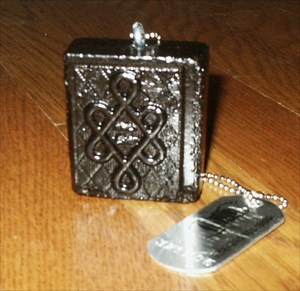| Trackable Options |
 Found this item? Log in.
Found this item? Log in. |
 Printable information sheet to attach to Tea Brick
Print Info Sheet
Printable information sheet to attach to Tea Brick
Print Info Sheet |
| There are 7 users watching this listing. |
The owner hasn't set their collectible preference.

On May 10, 1773, the British parliament authorized the East India Co. to export a half a million pounds of tea to the American colonies without imposing upon the company the usual duties and tariffs. With these privileges, the company could undersell American merchants and monopolize the colonial tea trade. With the Sugar Act of 1764, the Stamp Act of 1765 and the Townshend Acts of 1767, the Tea Act of 1773 was the last straw.
On November 27, 1773, three ships from the East India Co. loaded with tea landed at Boston but were prevented from unloading their cargo. Demanding that the tea be returned to where it came from or face retribution, the Sons of Liberty, led by Samuel Adams began to meet to determine the fate of the three cargo ships in the harbor.
On the cold evening of December 16, 1773, a large band of patriots, thinly disguised as Mohawk Indians, burst from the South Meeting House and headed towards Griffin's Wharf. Quickly, quietly, and in an orderly manner, the Sons of Liberty boarded each of the tea ships and went to work striking the chests with axes and hatchets. Thousands of spectators watched in silence as the sounds of ax blades splitting wood rang out from Boston Harbor. Once the crates were opened, the patriots dumped 9,659 pounds sterling worth of Darjeeling tea into the sea.
The patriots worked feverishly, fearing an attack by Admiral Montague at any moment. By nine o'clock p.m., the Sons of Liberty had emptied a total of 342 crates of tea into Boston Harbor. Fearing any connection to their treasonous deed, the patriots took off their shoes and shook them overboard. They swept the ships' decks, and made each ship's first mate attest that only the tea was damaged.
When all was through, Lendall Pitts led the patriots from the wharf, tomahawks and axes resting on their shoulders. A fife played as they marched past the home where British Admiral Montague had been spying on their work. Montague yelled as they past, "Well boys, you have had a fine, pleasant evening for your Indian caper, haven't you? But mind, you have got to pay the fiddler yet!"
England's response was the passing of the so-called Intolerable Acts which in turn precipitated the forming of the First Continental Congress to consider united resistance.
The Revolution had begun.
People today have an image in their minds of the Sons of Liberty dumping loose tea into the harbor, the kind of thing one might find by tearing open a tea bag. But, in fact, the tea of the day was compressed into 2.5 pound black bricks. These bricks were used as money and had break lines so that they could "make change" by being cut up into smaller blocks.
The English word "cash" comes from the Chinese character for money written on the backs of these bricks. And the Chinese chose this character to represent the French word cache meaning to press. Given the contemporary meaning of cache, this travel bug comes linguistically full circle.
Mission: This travel bug's goal is to travel about the original thirteen Colonies, visiting sites related to the American Colonial period and the Revolutionary War. As you log the cache, log also a piece of local relevant history if you can.
Because they are so tightly compressed, tea bricks are water resistant. The morning after the Boston Tea Party, co-conspirators fearing that the floating bricks would be recovered, rowed out in boats and beat the bricks with oars until they broke up and sank. Even so, I wouldn't want a sodden wet tea brick to destroy a cache site so I have sealed the tea brick to make it even more water resistant.
This is a real tea brick and is actually made out of tea but do not try to shave the brick and make tea with it. If you want tea bricks of your own, I ordered mine from the Illinois and Wisconsin Fur Co. Even if you don't make tea with them, they have a very pleasant odor.
The Eyewitness account of Participant George Hewes
Tea Money of China